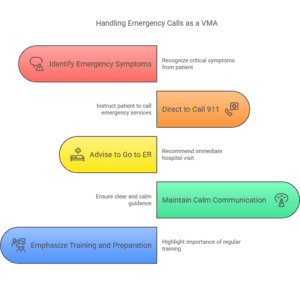On-Demand Outsourcing BPO Services for Healthcare Providers With 24/7 Coverage!
Save up to 70% on staffing costs!
Browse Specialty Staffing ServicesSummarize this blog post with:
How VMAs Should Handle Emergency Calls Without Hesitation?

Okay, let’s be real for a second. If you’re a Virtual Medical Assistant (VMA), you probably spend most of your time handling things like scheduling appointments, checking insurance, or dealing with prescription refills. But every now and then, a patient calls in panicked—something is seriously wrong. Handling emergency calls as a VMA is a critical skill, and when that happens, you need to know exactly what to do.
You’re not a doctor, and you’re not physically there, but that doesn’t mean you don’t have a huge role to play in getting them the right help. So let’s talk about how to handle an emergency call without freaking out.
Spot the Signs of an Emergency
Most patients aren’t going to start a call by saying, “Hey, this is an emergency.” Instead, they’ll describe their symptoms, and you need to catch the red flags. Some words and phrases that should instantly put you on high alert:
- “I’m having chest pain.”
- “I feel like I can’t breathe.”
- “I think I might be having a stroke.”
- “I’m bleeding a lot, and it won’t stop.”
- “I have the worst pain I’ve ever felt.”
- “I feel like I’m going to pass out.”
If you hear anything like this, your brain should be screaming EMERGENCY.

Act Fast – No Hesitation
Once you know the patient is in distress, there’s zero room for delay. Here’s exactly what you should do:
- Tell them to call 911. Yes, it’s obvious, but don’t assume they know that. People panic and don’t always think straight. Say something firm but calm like:
- “This sounds like an emergency. You need to call 911 right now.”
- “Please don’t wait—call for help immediately.”
- Tell them to get to an Emergency Room. If they can, they need to go to the nearest hospital immediately. Say:
- “You need to get to the closest ER as soon as possible. Can someone take you?”
- DO NOT tell them to come to the doctor’s office. That’s not where emergencies get treated. If they ask, say:
- “Our clinic isn’t set up for emergencies. You need to go to a hospital.”
Stay Calm, Stay Clear
Here’s the deal—patients pick up on your energy. If you sound unsure, they might hesitate. If you sound panicked, they’ll panic more. So you have to be calm, clear, and direct.
- Do say:
- “Call 911 now.”
- “Go to the ER immediately.”
- “Your safety is the most important thing.”
- Don’t say:
- “It might not be a big deal, but…”
- “Can you wait for an appointment?”
- “I don’t know what to tell you.”
You want the patient to feel like you know what you’re talking about—even if your only job here is to get them to the right place.
Keep Learning, Keep Training
Let’s be honest—handling an emergency call is stressful. That’s why regular training is so important for Virtual Medical Assistants. At Staffingly, Inc., we make sure VMAs are always prepared by focusing on:
- Recognizing emergency symptoms fast
- Practicing clear communication
- Following the right emergency protocols
The more you practice, the more confident you’ll be when the moment actually happens.

What’s the Big Takeaway?
- Listen carefully for emergency keywords—chest pain, stroke, trouble breathing, severe bleeding, etc.
- Tell the patient to call 911 or go to the ER—no waiting, no hesitation.
- Never suggest coming to the doctor’s office—it’s not equipped for emergencies.
- Stay calm, be clear, and sound confident—your response matters.
- Keep training—the more prepared you are, the better you’ll handle real emergencies.
What People Are Asking?
What if the patient refuses to call 911?
Keep encouraging them. If they’re with someone, ask if that person can call. If needed, notify the clinic so they can follow up.
Can I call 911 for the patient?
No, since you’re offshore, you can’t directly call emergency services. Your job is to make sure the patient or someone near them does.
What if I’m not sure if it’s really an emergency?
When in doubt, assume it is. It’s always better to take it seriously.
What if the patient insists on waiting for their doctor?
Remind them that emergencies need immediate care and urge them to go to the ER.
What if the patient is alone and unable to move?
Advise them to call 911 immediately and stay on the line with emergency responders.
Disclaimer:
For informational purposes only; not applicable to specific situations.
For tailored support and professional services,
please contact Staffingly, Inc. at (800) 489-5877
Email: support@staffingly.com.
About This Blog: This Blog is brought to you by Staffingly, Inc., a trusted name in healthcare outsourcing. The team of skilled healthcare specialists and content creators is dedicated to improving the quality and efficiency of healthcare services. The team passionate about sharing knowledge through insightful articles, blogs, and other educational resources.
 Book a Demo to Build Your Team Today!
Book a Demo to Build Your Team Today!
 Read Case Studies
Read Case Studies 



 Virtual Medical Assistants
Virtual Medical Assistants



